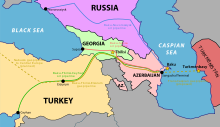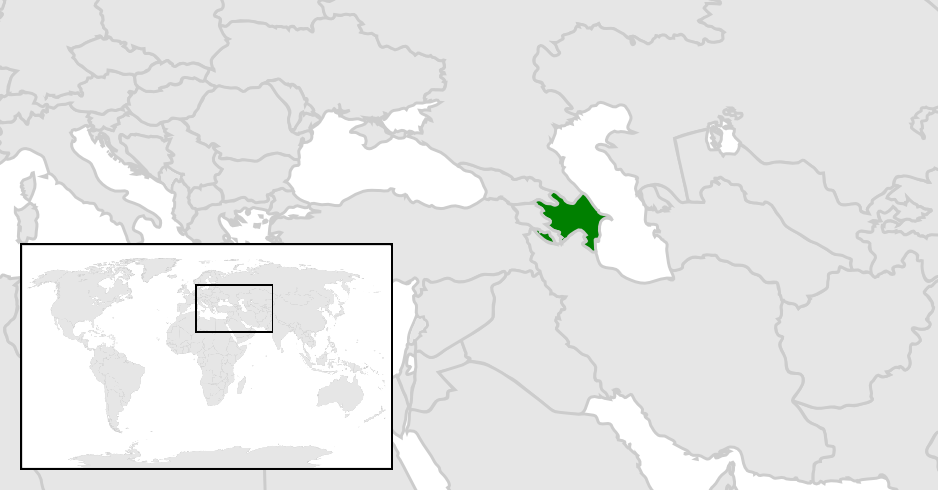User:Gunfighter~enwiki
| Baku–Tbilisi–Ceyhan pipeline | |
|---|---|
 Map of Baku–Tbilisi–Ceyhan pipeline | |
| Location | |
| Country | Azerbaijan, Georgia, Turkey, Turkmenistan,Central Europe, Russia |
| General direction | east–south-west |
| From | Baku (Sangachal Terminal), Azerbaijan |
| Passes through | Tbilisi, Erzurum, Sarız |
| To | Ceyhan & Erzurum, Turkey, Novorossiysk, Russia,Supsa, Georgia, Baumgarten an der March, Austria |
| Runs alongside | South Caucasus Pipeline |
| General information | |
| Type | oil |
| Partners | BP, SOCAR, Chevron, Statoil, TPAO, Eni, Total S.A., Itochu, Inpex, ConocoPhillips, Hess Corporation |
| Operator | BP, StatoilHydro, SOCAR, Transneft |
| Commissioned | 2006, 2015(planned Nabucco Pipeline), |
| Technical information | |
| Length | 1,768 km (1,099 mi) |
| Maximum discharge | 1 million barrels (160,000 m3) of oil per day |
| Shah Deniz | |
|---|---|
 | |
| Country | |
| Offshore/onshore | Offshore |
| Coordinates | 39°58′N 50°13′E / 39.967°N 50.217°E |
| Operators | Statoil (25.5%), SOCAR (10%), Total S.A. (10%), LukAgip, a joint company of Eni and LUKoil (10%), Oil Industries Engineering & Construction (10%), and Turkish Petroleum Overseas Company Limited (9%). |
| Field history | |
| Discovery | 1999 |
| Start of production | 2006 |
| Abandonment | NA |
The Caucasus region of the world is rich in natural resources. Because of these resources, multiple conflicts have been fought stemming from the desire to obtain them or to prevent others from obtaining them. Azerbaijan is the crown jewel of this wealth of resources. The nation is rich in energy resources like oil and natural gas. As well as the natural resources of gold, silver, iron, copper, titanium, chromium, manganese and cobalt. Baku, Azerbaijan’s capital city, sits at the head of all of the major pipelines from Central Asia to Europe.
These pipelines include the Baku-Tbilisi-Ceyhan (BTC) oil pipeline, the South Caucasus Pipeline connecting the Shah Deniz gas field to Europe. These pipelines all go through the same three nations, Azerbaijan, Georgia, and Turkey. There have also been talks of a Nabucco pipeline stemming from Azerbaijan through Turkey to Austria. As well as, liquefied natural gas stations off the Georgian coast if an agreement with Turkey cannot be brokered. Russia is currently the biggest supplier of natural gas to Europe. Russia, though connected through the Baku-Novorossiysk pipeline, seeks to exert more muscle on the energy market . This desire for more control of the flow of fossil fuel to Europe is believed to have been at the heart of the Russia–Georgia War and the South Ossetia War. Azerbaijan, itself, had to initially divert the pipelines through neighboring Georgia, instead of the closer and more direct Armenia due to the 1988-1994 Nagorno-Karabakh War.
The Nagorno-Karabakh War stemmed from ethnic differences between Armenia and Azerbaijan over the disputed Nagorno-Karabakh region. While energy was not the reason for the war, the consequences were felt in the energy trade and policies exhibited by Azerbaijan. Turkey being composed of an ethnic culture similar to Azerbaijan also dealt with Armenia with exclusion from economic developments. The most visible result is that not one single pipeline out of Azerbaijan passes through Armenia or the disputed territory. However, as a result of this the pipeline now travels through Georgia and earthquake-prone parts of Turkey.
On the other part of the pipeline, Georgia has been found to be a possible weak-link in the energy transit network. The interest in the region stems from Western Europe and the United States seeking a bypass of Middle Eastern and Russian oil and natural gas. With the fall of the Soviet Union leaving a number of ethnic enclaves in new nations, the situation left many conflicts ready to erupt at the slightest provocation. In 2008, Russia intervened on the Georgian territorial disputes with the breakaway regions of South Ossetia, and Abkhazia. Ossetia is a region in the Caucasus that is separated by Russia in the North and Georgia to the South. Abkhazia has long been a separatist region in Georgia that has been a source of internal conflict.
The 2008 South Ossetia War was believed to be started by Georgia seeking to end the Ossetian breakaway region for the last time. However, as Georgian forces converged, Russian forces entered the conflict. There has been some degree of uncertainty towards which side caused the conflict to escalate. On December 2nd, 2008, an European Union report was ordered to determine who started the conflict. This report determined that:
The Russian superiority in arms and equipment quickly ended the conflict and brought independence to these breakaway regions in a fierce battle. Undoubtedly, these regions will provide any excuse for further Russian intervention to further pressure the BTC and any future pipelines out of Georgia. However, Georgia has the ability to achieve some measure of revenge through stymieing Russia's bid to join the World Trade Organization.
As Azerbaijan continues to grow and develop new pipelines of natural gas and oil to Europe and Central Asia, it may only be a matter of time before Russia seeks a bigger share of the Azerbaijan natural resource market to further pressure Europe and the United States towards dependence on their oil and gas. In the case of the United States, this is sort of ironic due to US interest being due to a desire to avoid dependence Middle Eastern oil. Nonetheless, the bloody history of the region has caused the pipelines to divert into more conflicted area, leaving the world to wonder how long will the supply of these resources be safe and reliable.
References[edit]
[1] [2] [3] [4] [5] [6] [7] [8] [9] [10] [11] [12]
- ^ Ismailov, Eldar, and Vladimer Papava. "A new concept for the Caucasus." Journal of Southeast European & Black Sea Studies 8, no. 3 (September 2008): 283-298. Academic Search Premier, EBSCOhost (accessed April 25, 2010).
- ^ Freifeld, Daniel. "THE GREAT PIPELINE OPERA." Foreign Policy no. 174 (September 2009): 120-127. Academic Search Premier, EBSCOhost (accessed April 25, 2010).
- ^ Partlett, William. "Enforcing Oil and Gas Contracts Without Courts." Demokratizatsiya 18, no. 1 (Winter2010 2010): 74-93. Academic Search Premier, EBSCOhost (accessed April 25, 2010).
- ^ Rachinskiy, M. Z., et al. "The South-Caspian Basin's Mineral Resource Base (1990-2005 Exploration Results and Future Potential)." Energy Sources Part A: Recovery, Utilization & Environmental Effects 30, no. 1 (January 2008): 79-91. Academic Search Premier, EBSCOhost (accessed April 25, 2010).
- ^ Ozturk, Harun Kemal, and Arif Hepbasli. "Natural Gas Implementation in Turkey. Part 2: Natural Gas Pipeline Projects." Energy Sources 26, no. 3 (February 15, 2004): 287-297. Academic Search Premier, EBSCOhost (accessed April 25, 2010).
- ^ Ahmedov, Rufat. "Financing for the Baku-Tbilisi-Ceyhan Pipeline Sealed." Transitions Online (February 16, 2004): N.PAG. Academic Search Premier, EBSCOhost (accessed April 25, 2010).
- ^ Pagnamenta, Robin. "A LIFELINE, BUT NOT FOR THEM." New Statesman 134, no. 4767 (November 21, 2005): 30-31. Academic Search Premier, EBSCOhost (accessed April 25, 2010)
- ^ LeVine, Steve, et al. "KAZAKH OIL A WAR OF NERVES." BusinessWeek no. 4100 (September 22, 2008): 74-77. Academic Search Premier, EBSCOhost (accessed April 25, 2010).
- ^ Chazan, Guy. "Raids Suggest Russia Targeted Energy Pipelines." Wall Street Journal - Eastern Edition, August 14, 2008., A6, Academic Search Premier, EBSCOhost (accessed April 25, 2010).
- ^ LeVine, Steve. "A Roadblock to Russian Oil and Gas." BusinessWeek Online (August 12, 2008): 5. Academic Search Premier, EBSCOhost (accessed April 25, 2010).
- ^ Welt, Cory. "The Thawing of a Frozen Conflict: The Internal Security Dilemma and the 2004 Prelude to the Russo-Georgian War." Europe-Asia Studies 62, no. 1 (January 2010): 63-97. Academic Search Premier, EBSCOhost (accessed April 25, 2010).
- ^ "Independent International Fact-Finding Mission on the Conflict in Georgia." September 2009.http://www.ceiig.ch/Index.html (accessed April 21, 2010).
